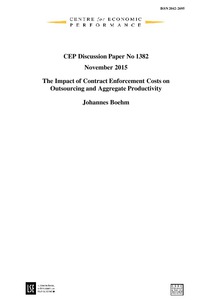The impact of contract enforcement costs on outsourcing and aggregate productivity

London School of Economics and Political Science. Centre for Economic Performance
LSE - London
2015
59 p.
contract ; enterprise level ; productivity ; statistics ; outsourcing ; cost containment
CEP Discussion Paper
1382
Production management
English
Bibliogr.
"Legal institutions affect economic outcomes, but how much? This paper documents how costly supplier contract enforcement shapes firm boundaries, and quantifies the impact of this transaction cost on aggregate productivity and welfare. I embed a contracting game between a buyer and a supplier in a general-equilibrium model. Contract enforcement costs lead suppliers to under produce. Thus, firms will perform more of the production process in-house instead of outsourcing it. On a macroeconomic scale, in countries with slow and costly courts, firms should buy relatively less inputs from sectors whose products are more specific to the buyer-seller relationship. I present reduced-form evidence for this hypothesis using a novel measure of relationship-specificity, which I construct from microdata on US case law. I then structurally estimate my model, and perform welfare counterfactuals. Setting enforcement costs to US levels would increase real income by an average of 7.5 percent across all countries, and by an average of 15.3 percent across low-income countries. Hence, transaction costs and the determinants of firm boundaries are important for countries' aggregate level of development."
Digital
The ETUI is co-funded by the European Union. Views and opinions expressed are however those of the author(s) only and do not necessarily reflect those of the European Union or the ETUI.